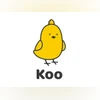Beleaguered microblogging platform Koo, once seen as a home-grown rival to social media giant X (formerly Twitter), has shut down its operations, the company’s founder Aprameya Radhakrishna said in a LinkedIn post on Wednesday.
“Here’s the final update from our end. Our partnership talks fell through, and we will be discontinuing our service to the public. We explored partnerships with multiple larger internet companies, conglomerates, and media houses, but these talks didn’t yield the outcome we wanted,” Radhakrishna said.
He added that most interested parties “did not want to deal with user-generated content and the wild nature of a social media company. A couple of them changed priorities almost close to signing”.
Unverified reports suggest VerSe Innovation, which owns Dailyhunt and ShareChat, was in talks to acquire Koo.
“While we would’ve liked to keep the application (app) running, the cost of technology services to keep a social media app running is high, and we’ve had to take this tough decision,” Radhakrishna said.
More From This Section
Koo’s entry into the startup dead pool comes at a time when the startup world has been grappling with the so-called funding winter.
In 2022, as many as 5,868 startups shut shop owing to prevailing macroeconomic headwinds. However, this figure has come down to 1,720 in 2023 and just four in 2024 so far, as macro conditions have improved, according to data from Tracxn, a market intelligence platform.
Some startups that have entered the dead pool over the past years include Niki, ZipGo, Crejo.Fun, FrontRow, and GramFactory, among others.
A strong start
Founded in 2020, Koo was a multilingual microblogging platform that allowed users to interact via text, audio, and video. It also allowed influencers to network and have conversations with their fans.
The Bengaluru-based firm benefited from tussles between X and the Indian government over improper content moderation in 2020, leading many celebrities, government officials, and citizens to switch from X to its indigenously built alternative.
In the three years since its launch, the indigenous platform amassed over 60 million app downloads to become the second-largest microblogging platform in the world, with support for more than 20 languages and over 100 brands advertising on the platform.
At its peak, the platform was witnessing about 2.1 million daily active users and 10 million monthly active users, and, according to Radhakrishna, was “just months away from beating Twitter in India in 2022”.
Since then, however, the company faced a spate of issues. Over the past two years, it has been at the receiving end of declining users, layoffs, and challenges in generating revenue.
Growth pangs and financial woes
In April, Koo announced that it was halting salary payments to its employees for the month as it grappled with financial constraints.
Its spot as the second-largest microblogging platform was also overtaken by Meta’s Threads, which amassed 100 million global users within just five days of its launch.
The company’s workforce reportedly shrank by over 80 per cent since June 2022, including senior-level exits, leaving some 50 employees on board. The remaining employees faced salary cuts of up to 40 per cent since October 2023.
The platform’s active users fell from 7.2 million in June 2023 to 2.7 million in March, marking a 62 per cent decline. The decline is partly attributed to the cessation of customer acquisition campaigns since June 2022.
“A prolonged funding winter which hit us at our peak hurt our plans at the time, and we had to tone down our growth trajectory. Social media is probably one of the toughest industries to break into, even with all available resources, as you need to grow users to a significant scale before revenue becomes feasible. We needed five to six years of aggressive, long-term, and patient capital to make this dream a reality,” Radhakrishna said.
How did Koo get here?
Despite having raised roughly $57 million to date from prominent investors like Tiger Global, Accel, and Kalaari Capital, among others, at a peak valuation of $285.5 million, the company failed to secure Series C funds, which further compounded its financial woes.
This was largely due to the company’s lacklustre financial performance over the years.
In 2021-22, the company generated an operating income of only Rs 14 lakh, up from Rs 8 lakh the previous year. Its losses, on the other hand, surged a massive 460 per cent year-on-year to Rs 197 crore.
A majority of the company’s issues stem from the absence of a viable revenue model, which forced the company to rely heavily on cash burn for user acquisition.
Factors like the reduction in advertising budgets among large brands after the pandemic and the platform’s diverse user base did not work in the company’s favour either.
Koo’s attempts at monetising its platform via initiatives like Koo Premium — which allowed content creators to earn money by exclusively sharing content only with their subscribers, and Koo Coins — wherein it rewarded users for spending more time on the platform, failed to provide meaningful returns.
Moreover, it failed to retain the users that jumped ship from X in late 2020 and 2021 when the tech giant was facing government action.
“Patient, long-term capital is essential to build ambitious, world-beating products from India — be it in social media, artificial intelligence, space, electric mobility, or other futuristic categories. It will need a lot more capital when the space has a global giant already,” Radhakrishna said.
)